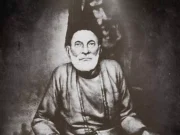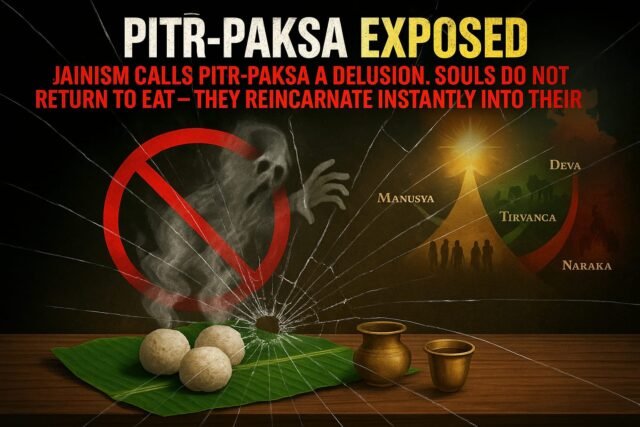– Why your ancestors never come back to eat?
1. The Illusion of Ancestors Returning
Hindu belief holds that ancestors descend to partake of piṇḍa (rice balls) and tarpaṇa (water oblations) during Pitṛ-Pakṣa. Jainism rejects this root and branch.
The very idea that dead souls hover around, waiting for food, is mithyātva — false belief, born of fear and delusion. Jain Āgamas are unflinching: the soul does not wait at your doorstep, it does not sip your water, it does not dine on your offerings.
2. The Soul’s Real Journey — Into the Four Gatis
What actually happens at death? Jain philosophy is crystal clear.
The Ācāranga Sūtra (1.1.2) declares:
“As a man leaves one house and enters another, so does the soul leave one body and enter another according to karma.”
In Jainism, the moment of death is the moment of rebirth. The soul immediately takes a new birth in one of the four gatis (realms of existence):
- Deva (celestial beings),
- Manuṣya (humans),
- Tiryañca (animals, birds, insects, plants),
- Naraka (hellish beings).
There is no stopover, no wandering, no ghostly return. The belief in ancestors returning is pure mitya-darshan — false vision.
3. Do the Dead Eat During Pitṛ-Pakṣa?
Uttarādhyayana Sūtra (10.34):
“Each soul is its own saviour; no one can purify or liberate another. Every being moves by its own deeds.”
This demolishes the very foundation of Pitṛ-Pakṣa. No piṇḍa, no priest, no tarpaṇa can alter the destiny of the soul. The karmic journey is solitary.
The notion that rice balls reach your grandfather in another world is not just wrong — it is a delusion packaged as devotion.
4. What Truly Follows the Soul?
The Dasavaikālika Sūtra (4.20) is uncompromising:
“Not adornments, not wealth, not relatives, not ritual gifts — only conduct follows the soul. This is the eternal law.”
Here lies the hard truth:
- Your ancestor does not need your banana-leaf feasts.
- What uplifts them is the puṇya generated by your ahimsa, charity, study, and atonement.
Anything else is mithyātva — an empty show.
5. Is There a Jain Equivalent of Pitṛ-Pakṣa?
No. Categorically, no.
Jainism has no fortnight to feed the dead. What it has is memory expressed through dharma.
When Lord Mahāvīra attained nirvāṇa, the Kalpa Sūtra records:
“The Blessed Mahāvīra attained nirvāṇa… The community of monks, nuns, and lay followers assembled; they listened to the dharma and engaged in charity.”
Notice: they did not attempt to serve Mahāvīra food. They turned to truth, not illusion.
6. The Inauspicious Time Delusion
Hindu practice brands Pitṛ-Pakṣa as inauspicious for weddings, business, housewarmings. Jainism destroys this delusion with one verse.
Uttarādhyayana Sūtra (14.25):
“No moment is by itself auspicious, no moment is inauspicious; for the wise, vigilance is the only true auspiciousness.”
Thus, a Jain may start a business, buy a car, or perform a grah-praveś during Pitṛ-Pakṣa without doctrinal guilt.
The only truly inauspicious beginning is one tainted with violence, greed, or falsehood. Time itself is not your enemy.
7. Hard Truth — Pitṛ-Pakṣa vs Jainism
Let’s lay it bare:
- Souls do not come back to eat.
- Pitṛ-Pakṣa is a Hindu cultural construct, not a Jain doctrine.
- Jainism calls such rituals mithya — illusions that cloud right vision.
- The soul moves instantly into its next gati — there is no waiting room of hungry ghosts.
- Charity, ahimsa, and conduct are the only true offerings.
Pitṛ-Pakṣa is superstition. Jainism is clarity.
8. Final Blow
Pitṛ-Pakṣa thrives on fear and the delusion of returning ancestors. Jainism answers with fearless truth: no ghosts sit at your table.
The departed have moved on, into their next existence.
The living should stop feeding shadows, and start feeding dharma.





































